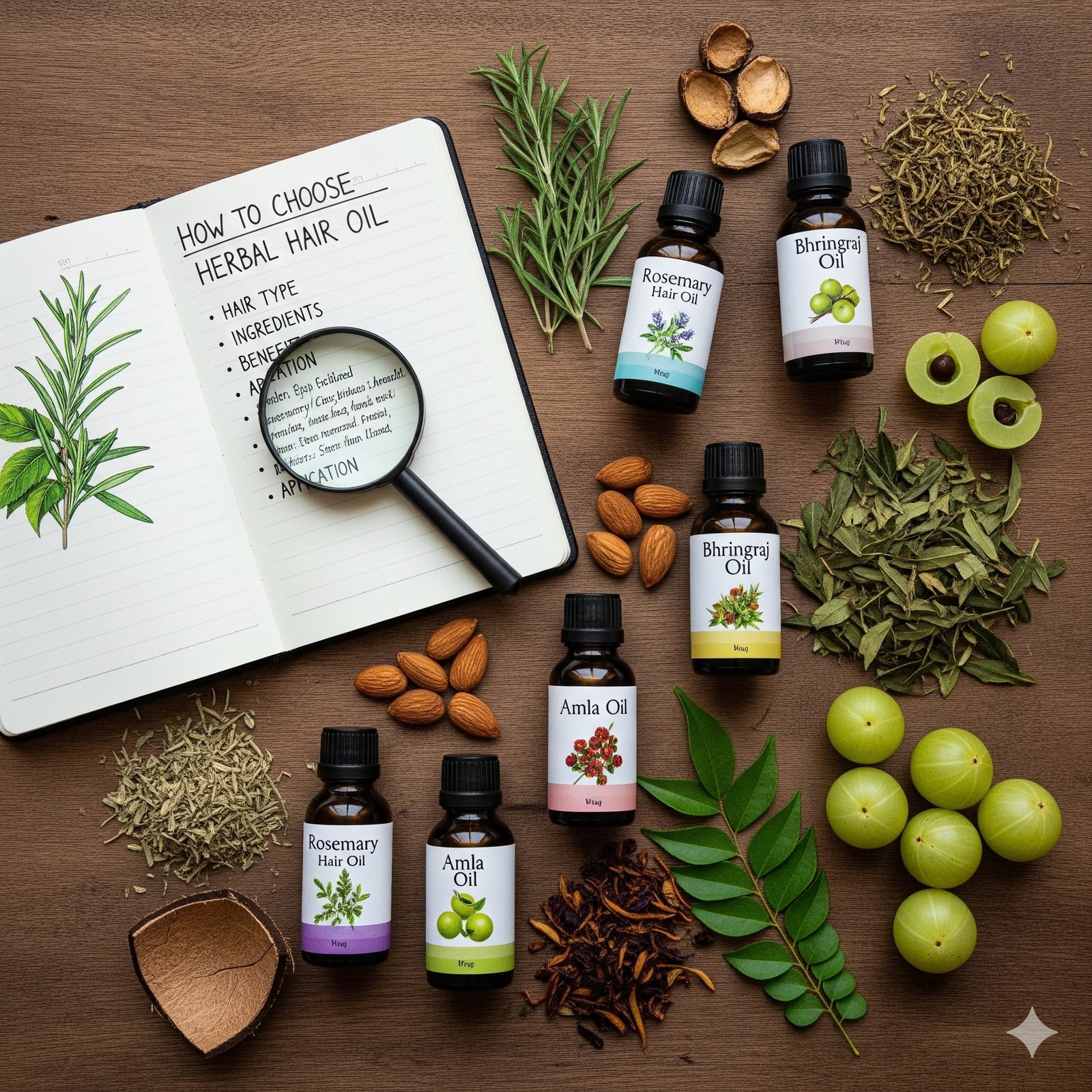
In a world overflowing with chemical products, the timeless wisdom of nature often reveals the most effective secrets for our health. When it comes to taking care of our hair, nothing compares to the nourishing benefits of herbal hair oils. This is especially true in India, where the tradition of tel malish (oil massage) is a cherished practice. Here, herbal hair oils are more than just beauty items; they represent a holistic approach to maintaining hair health. But with so many choices available, how do you find the right one for your scalp? Let’s dig in.
Why Herbal Hair Oils? A Glimpse into Indian Tradition
Before we get into the selection process, let’s take a moment to appreciate why herbal hair oils hold such a special place, particularly in India. For centuries, Ayurveda—the ancient Indian healing system—has promoted the use of natural ingredients for maintaining healthy hair and scalp. These oils are often infused with powerful herbs like Bhringraj, Brahmi, Amla, Neem, and Hibiscus, each known for its unique benefits. They don’t just sit on top of your hair; they actually penetrate the scalp, nourishing hair follicles, boosting blood circulation, and tackling underlying issues. This traditional knowledge is what makes “herbal hair oil India” synonymous with quality and effectiveness.
Getting to Know Your Scalp: The First Step in Choosing the Right Oil
Finding the right herbal hair oil isn’t a one-size-fits-all endeavor. The secret lies in understanding your scalp type. Just like your facial skin, your scalp can be oily, dry, normal, or sensitive. Overlooking this vital step can lead to disappointing outcomes or even worsen existing problems.
• Oily Scalp: If your hair feels greasy just a day or two after washing, you probably have an oily scalp, which can result from overactive sebaceous glands.
• Dry Scalp: If your scalp feels tight, flaky, or itchy, you might be dealing with dryness, which can lead to dull and brittle hair.
• Normal Scalp: Lucky you! Your scalp feels comfortable, and your hair stays just the right amount of oily without becoming dry between washes.
• Sensitive Scalp: If your scalp is prone to redness, itching, or irritation from various products, you’ll want to stick with gentle, soothing ingredients.
Matching Herbs to Your Scalp Concerns
Once you’ve figured out your scalp type, you can choose herbs that offer specific benefits tailored to your needs.
For Oily Scalp: Balancing and Cleansing
Look for oils that help regulate sebum production and have anti-inflammatory properties.
Neem: This herb is famous for its antibacterial and antifungal benefits, making it great for fighting scalp infections and reducing excess oil.
Tea Tree Oil (in carrier oil): Known for its antiseptic properties, it helps cleanse the scalp and prevent buildup.L
emon/Lime Essential Oil (in carrier oil): These oils can help balance oil production while giving your scalp a refreshing boost.
For Dry Scalp: Moisturizing and Nourishing
Your scalp craves deep hydration and soothing ingredients to ease irritation.
Bhringraj: This powerhouse herb is celebrated for promoting hair growth and deeply nourishing the scalp, tackling dryness and flakiness.
Amla (Indian Gooseberry): Packed with Vitamin C, Amla strengthens hair follicles and provides deep conditioning to combat dryness.
Brahmi: This herb calms and soothes the scalp, reducing itchiness and promoting overall scalp health.
Hibiscus: It moisturizes and conditions, adding shine and softness to dry hair.
For Normal Scalp: Maintenance and Protection
Even a normal scalp can benefit from regular oiling to keep it healthy and prevent future issues.
Amla and Bhringraj blend: A classic duo for overall hair health, promoting growth and shine.
Coconut Oil: A versatile base oil that penetrates deeply and conditions well.
Almond Oil: Light and nourishing, perfect for everyday use
For a Sensitive Scalp: Soothing and Gentle
When it comes to oils, look for those that have calming and anti-inflammatory benefits, and don’t forget to do a patch test first!
Chamomile: This one’s a classic for its soothing and anti-inflammatory effects.
Lavender Essential Oil (mixed with a carrier oil): It’s calming and can really help ease scalp irritation.
Aloe Vera (infused oil): Gentle and hydrating, perfect for sensitive skin.
Essential Scalp Care Tips Beyond Oiling
Picking the right oil is just the start. To really boost the benefits, try these scalp care tips:
Regular Massage: While applying your favorite herbal hair oil, take a moment to gently massage your scalp for about 5-10 minutes. This helps improve blood circulation, allowing nutrients to reach your hair follicles more effectively.
Leave-in Time: For the best results, let the oil sit for at least an hour, or even overnight if that works for you, before washing it out.
Gentle Cleansing: Use a mild, sulfate-free shampoo to rinse off the oil. Harsh shampoos can strip away your scalp’s natural oils.
Balanced Diet: What you eat plays a big role in your hair health. Make sure your diet is packed with vitamins, minerals, and proteins.
Hydration: Keep yourself hydrated by drinking plenty of water, which helps keep your scalp and body in good shape.
Avoid Over-washing: Washing your hair too often can throw off your scalp’s natural oil balance.
Stress Management: Stress can lead to various hair problems. Try to include some stress-relieving activities in your daily routine.
The Journey to Healthy Hair
Finding the right herbal hair oil for your scalp is a lovely act of self-care that draws on ancient wisdom. It might take some experimenting to discover your ideal match, but the path to healthier, more vibrant hair is definitely worth it. Embrace nature’s gifts, pay attention to your scalp, and watch your hair flourish. Happy oiling!
